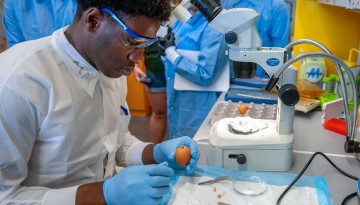Cornell University Hosts Annual 4-H Event Where Teens Explore Potential Career Options
Through conversations and hands-on learning opportunities, nearly 250 youth from across New York state learned about different career paths at the annual 4-H Career Explorations Conference, hosted by Cornell and New York State 4-H on campus June 26-28.
Students stayed overnight in dorms; spent evenings bowling, swimming or playing lawn games at Helen Newman Hall; ate meals in dining halls; and shopped at the Cornell Store. For many, it was their first taste of college life.
“I’m here because I want to explore my interests in different careers like biomedical engineering, since I plan on pursuing a career in the future in engineering and STEM,” said Jada Murphy, a rising sophomore from Haverstraw, New York. “This event has helped me get a feel of what my surroundings and learning environment might be like.”
Cornell faculty and graduate students led programs in two tracks. In the University U track, for those in grade 8 and older, students rotated through workshops in fields such as mental health, climate-smart farming, fitness and nutrition, archaeology and nanotechnology. In the Focus for Teens track, students entering grades 10 through 12 selected one of 12 programs in fields such as equine and veterinary science, astronomy, hospitality, media design, women in science, engineering, psychology research or food science.
“We’re so grateful for the faculty, staff and students who invited youth into their spaces and work, sharing the joy of discovery and championing youth leadership,” said Alexa Maille, interim director of NYS 4-H. “Youth from across New York state and beyond had the opportunity to find and fuel sparks, try out possible futures and explore how they can thrive in careers and life.”
In Emerson Hall, 15 young people participated in “Animal Trackers: A Tech Expedition,” where they learned how researchers monitor the movements of domestic and wild animals, led by Susan Hoskins, senior extension associate and director of the Institute for Resource Information Sciences (IRIS) in the College of Agriculture and Life Sciences.
“We explored the many ways animal movement is seen and recorded, highlighting geospatial connections,” Hoskins said. “Watching with our own eyes, using GPS location technology, creating digital maps and envisioning a positive digital future were all on the agenda.”
IRIS integrates environmental information science and technologies to support education and research. Its work includes outreach and extension activities like the 4-H Geospatial Sciences program, in which youth learn about GPS, GIS and remote sensing technology through geocaching, or using GPS receivers to look for hidden treasure boxes in the outdoors.
For the Career Explorations workshop, Hoskins said she used geo art – or the practice of hiking a path that creates an image outline when mapped – soil painting and collage to help participants spark creative ideas. They also had the chance to spot Big Red, Cornell’s beloved female red-tailed hawk, outside the lecture hall.
“The whole 4-H Geospatial team enjoyed preparing and sharing with youth, focus assistants, and chaperones,” Hoskins said. “I especially appreciated working with Alexa and other presenters in the months leading up to 2024 Career Explorations. Learning the basics of Positive Youth Development, sharing activity ideas and strategies, and hearing the enthusiasm and excitement in the voices of presenters – both experienced and new to teaching – helped us all craft a great experience for everyone.”
Other student groups learned about food science and created their own color-changing summer drinks; designed sustainable, peaceful landscapes using analog and digital tools; and explored the cosmos by following the journey of a single atom beginning with the Big Bang, through the birth of the solar system and the origins of life on earth.
“I’m originally from Nigeria and I’ve always been interested in science and engineering and I’m really excited to be here,” said Nasir Mohammed, a rising junior from Troy, New York. “Bioengineering is where life and engineering meet and I think I would love to be in a career like this because this helps humanity.”
During the closing ceremony, youth representatives from each program reflected back on their experience, detailing what was the most impactful part of each program. Many said they are enthusiastic to return to the event again next year.

